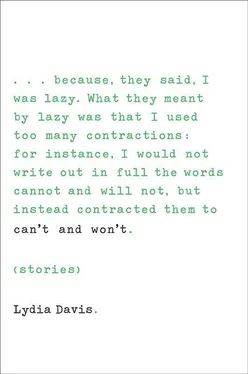The announcement, from the pilot, terrified me. The terror was very physical, something like an icy bolt down my spine. With his announcement, everything had changed: we might all die within the next hour. I looked, for comfort or companionship in my fear, at the woman in the seat next to me, but she was no help, her eyes closed and her face turned away towards the window. I looked at other passengers, but each seemed absorbed in comprehending what the pilot had said. I, too, shut my eyes, and held on to the arms of my seat.
A little time passed, and then there was a clarification from the steward, who announced approximately how long we would be circling above the airport. The steward was calm. As he spoke, I kept my eyes fixed on his face. This was when I learned something I stored away to remember later, on other flights, if there were to be other flights: if I was worried, I should look at the face of the steward or stewardess and read his or her expression for a clue as to whether I should be worried or not. This steward’s face was smooth and relaxed. The emergency was not one of the worst, he added. I looked across the aisle and met the eyes of a passenger in his sixties who was also calm. He told me he had flown over nine million miles since 1981 and experienced a number of emergency situations. He did not go on to describe them.
But now the steward was doing something that only intensified my fear: still calm, but perhaps with the calm of fatalism, I now thought, fatalism produced by his long training and experience, or perhaps simply an acceptance of the end, he was instructing the people in the first row point by point what each of them was to do in case he himself became incapacitated. Watching him instruct them, in my eyes they were suddenly elevated from being mere passengers to being his assistants or deputies, and I saw him, already, reduced to helplessness, dead or paralyzed. Even if only in my imagination, the fatal crash was already imminent. At that point, I realized that anything other than routine behavior from a steward or stewardess would alarm me.
Our lives might be almost over. This required an immediate reconciliation with the idea of death, and it required an immediate decision as to the best way to leave this world. What should be my last thoughts on this earth, in this life? It was not a matter of looking for solace but for acceptance, some way of believing that it was all right to die now. First I said goodbye to certain people close to me. Then I had to have a larger thought, for the very end, and what I found to be the best thought was the thought that I was very small in this large universe. It was necessary to picture the large universe, and all the galaxies, and remember how very small I was, and then it would be all right that I should die now. Things were dying all the time, the universe was mysterious, another ice age was coming anyway, our civilization would disappear, so it was all right that I should die now.
While I was thinking this large thought, my eyes were again shut, I was clasping my hands together until they were moist, and I was bracing my feet very hard against the base of the seat in front of me. It wouldn’t help to brace my feet if we had a fatal crash. But I had to take what little action I could, I had to assert my tiny amount of control. In the midst of my fear, I still found it interesting that I thought I had to assert some control in an uncontrollable situation. Then I gave up taking any action at all and observed another interesting thing about what was happening now inside me — that as long as I felt I had to take some action, I was anguished, and when I gave up all responsibility and stopped trying to do anything at all, I was relatively at peace, even though the earth meanwhile was circling so far below us and we were so high up in a defective airplane that would have trouble landing.
The airplane circled for a long time. Either later, or at the time, I learned that while we were circling, preparations were being made on the ground for an emergency landing. The longest runway was being cleared, because the plane would be coming in at a high speed and would therefore have to travel a long way as it slowed down. Fire engines were brought out and parked by the runway. There were several possible problems with landing at such a high speed. The wheels could give way and collapse, the plane then coasting on its belly. The friction of coasting could cause a fire, or the speed of the plane could cause it to tip forward, crushing its nose. If the plane was coasting on its belly, or if a tire burst, the pilot could lose control of the steering and the plane could veer off the runway and crash.
At last the long runway was clear and the fire engines were in place, and the pilot began the descent. We passengers could not perceive anything out of the ordinary in the way he was flying the plane during the descent, but as the moment came for landing we grew more nervous: whereas before, the possible disaster was in our near future and we were still untouched, now it was just moments away.
In a normal landing, a plane comes in quite steeply, maybe at a 30-degree angle, and it often then bumps or bounces a little on the ground as it makes contact. Moving at such a high speed, we could not safely do that, so the pilot descended in wide circles almost all the way down to the ground before he headed for the runway, approaching it so low that its path was at almost no angle to the ground. In order to have the whole length of the runway for decelerating, he touched the plane down as soon as he passed the edge of the runway, putting the wheels to the asphalt so gently that we hardly felt it: the landing was smoother than any I had experienced before. He then slowed the plane very gradually until we were taxiing at a normal speed. He had done a beautiful job of landing, and we were safe.
Now, of course, the passengers all clapped and roared, in their relief, at the same time looking at one another and gazing out the windows in some awe at the fire engines that had not been needed. As the cheering died down, the sound of talking and laughing in the cabin increased. The man across the aisle told me about other near-disasters he had experienced, such as a fire aboard his airplane. We were informed by the steward, who also became more talkative now that we were on the ground, that pilots practice this sort of landing many times in their training. It might have helped us to know this earlier, but perhaps it would not have.
I was thinking about the landing over my dinner that night, in the orderly, bustling ground-floor restaurant of my hotel. I was looking into the face of a very small fried egg, a quail egg, on my plate, and it occurred to me that if the outcome had been different, the egg would at this very moment still have been looking up at someone, but at someone else, not me. The egg would have been looking up at a different fork, or even the same fork, but in a different hand. My hand would have been somewhere else, maybe in a Chicago morgue.
I was also writing down what I could remember of the landing, while my dinner cooled. The waiter, observing my plate, said something like “Your pen is moving faster than your fork,” and then he added, as an afterthought, “which is the way it should be.” At that, I liked him better. I had not liked him before, with his lank locks of hair and his overly friendly jokes.
Meanwhile, in the background, at the hotel reception desk, a slim, cautious, gray-bearded Englishman was asked by the clerk, “What is your name?” and he answered, “Morris. M, o, r, r, i, s.”
The Language of the Telephone Company
“The trouble you reported recently
is now working properly.”
The Coachman and the Worm
story from Flaubert
Читать дальше












